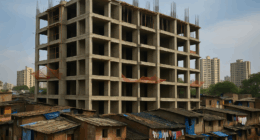According to Colliers’ latest report, “The Multifaceted Occupier Landscape of India Office Market,” Global Capability Centers (GCCs) are poised to significantly influence the demand for Grade A office space in India over the next few years. The report, unveiled at the RICS CRE FM conference, highlights several key trends shaping the commercial real estate landscape.
Increased Demand from Engineering, Manufacturing, and BFSI Sectors
The report forecasts that between 2025 and 2027, engineering and manufacturing, along with banking, financial services, and insurance (BFSI) sectors, will each lease approximately 11-12 million square feet of office space annually. This demand will collectively represent about 40% of the total office space market. This marks a notable increase from the previous three years, where these sectors accounted for 8-9 million square feet each.
Shift in Demand Patterns: GCCs as Knowledge and Innovation Hubs
GCCs are anticipated to drive around 40% of annual Grade A office space demand as they evolve into hubs for knowledge and innovation. This shift reflects a broader trend where traditional tech-dominated demand diversifies to include a wider range of occupiers, including those from engineering, manufacturing, healthcare, consulting, and flex spaces.
Leasing Trends Across Key Sectors
The report provides insights into leasing trends:
- Technology: Technology firms are expected to stabilize their space uptake at around 15 million square feet annually, a slight decrease from previous years.
- Engineering & Manufacturing: This sector’s demand is projected to rise to 12 million square feet annually.
- BFSI: The BFSI sector will see a growth in demand, reaching 11.5 million square feet per year.
- Flex Spaces: These are expected to account for 15-20% of total office leasing, with expansion into new geographies.
Regional Demand Insights
Bengaluru continues to lead in office space demand across most sectors, with anticipated annual leasing activity approaching 20 million square feet. However, cities like Hyderabad, Chennai, and Pune are gaining momentum. Hyderabad’s SBD and Chennai’s OMR Zone 1 are particularly noted for their increased traction among technology and BFSI firms.
Changes in Leasing Dynamics Post-Pandemic
The average transaction size has decreased to around 43,000 square feet in 2023, down 11% from 2019. Conversely, the number of deals has increased by 44%, reflecting a shift towards smaller, mid-sized office spaces as companies adopt distributed work models. The volume of flex space and engineering & manufacturing deals has surged by over 70% post-pandemic.
Emergence of Smaller Cities
While the top six cities (Bengaluru, Chennai, Delhi-NCR, Hyderabad, Mumbai, and Pune) remain central to office space demand, smaller cities such as Bhubaneswar, Chandigarh, and Coimbatore are emerging as high-potential growth centers.
Preference for Green-Certified Buildings
Sustainability is a major focus, with approximately 75% of office space take-up in 2024 expected to be in green-certified buildings. Engineering, BFSI, and technology sectors are leading this trend, aligning with broader ESG goals.
Conclusion
Colliers’ report underscores the evolving dynamics of the Indian office market, characterized by a shift towards occupier-driven demand and a heightened focus on sustainability. The findings indicate robust growth potential across various sectors and geographies, offering valuable insights for developers and investors in the commercial real estate sector.
Also Read: Flex Spaces to Play Major Role in Office Expansion, Survey Reveals









